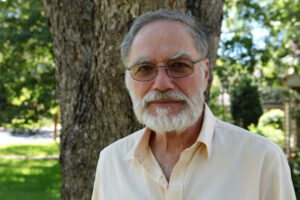The Case for Punctuation
Periods are gods, semicolons angels, the commas
their wings. It’s the words that are always wrong,
sinful and broken, intoxicatingly other than what
is meant. What does the wound remember?
this morning, low tide, the gulls
gliding over the water—
is wrong, but the commas are wings, line breaks
the days of creation:
—the gulls
and now the geese, rising as one
to suture the sky—
The period are gods, the em-dash their prophet, words
the pilgrims on their knees, asking to be forgiven.
Damn, Keats
Creator’s privilege, creator’s whimsy, creator’s bias, creator’s pride.
Object’s resistance, object’s desire to be left alone, object’s narcissistic needs.
So he mounts a rear-guard action, strikes behind enemy lines—
object’s rights, object’s pleasures, object’s candor, object’s pride—
revealing the soul for what it is: observable, feelable heat.
Damn, Keats, I wish you’d simply lived, married Fanny,
had kids, grown old…great sex ’til you were blue,
just to see what you’d do, what we lost. Solidarity with this world,
no doubt, but what it is, this world, you would have told us.
I wonder if a line of older poets ever since is Keats-grown-old,
allowed to ripen like the apples on his moss’d cottage-trees.
Galway, Hass, Charles Wright—old Stevens is old Keats,
the marriage gone sour, no sex. But we live and we leave,
and what is the soul, soul-making, but the left and leaving,
the presence of? I think of the corners of old band posters
left stapled to poles long after the poster’s torn down:
in the sunlight on the pole and in the night
behind the sun, the lost and the losing, a music unheard.
And a fragrance, too; the daphne in spring is jammed
with souls. Each with a task to complete, but they’re slow,
they look to us for help, This living hand, they say,
I hold it towards you. We feel them as heat—
object’s desires, object’s needs. Happy are the dead
when we help them with their work. It’s our work, too—
creator’s whimsy, creator’s pride.
What moves us moves them.
Put Your Money Where Your Mouth Is
Skin in the game means the game is played on you,
on me, our bodies. To suffer less, I wished to believe
I played with the house’s money,
had no skin in the game, the house
this world, its oceans its money,
its rivers its clouds. Any fool can steal
from Yeats or Plath and make it rain.
The whales full of plastic have skin
in the game. Put your money where your mouth is,
I say to my poems. Your moolah,
your cabbage, your bread, your dough.
Death needs no helpers.
Moon, I Said
When, Moon, I said, be straight with me, have I got a chance?
granted she didn’t say, Oh, baby, baby, but did she
or did she not—you were there—give me The Look?
So, Moon, I said, emboldened, the word itself, “moon,”
is it—give it to me straight—still . . . usable? No, she said.
Remember the fading flashlight you took to bed
to read with under the covers? More like that,
but the text is love, each poem a mirage
of light. Write to remember, write to forget.
But I’ll need words, I said,
are any words still usable?
A few, she said. Dumb down, come to me
like a baby. The latch, the suckle, the puddles
of breath—the baby does not sing a song about the breast.
You Alive
You must change the past, you alive,
make it other, without so much suffering.
Impossible, you say.
But think, you alive, what else
is language for? Name the river
running through your thirsty self.
A telescope at the South Pole
can see the beginning of time,
and the milliseconds after. Write it
with your living hand, who are alive,
soothe us with the solace of eternity.
Declaration
Dark, thundering, backlit, the clouds are rising
behind the mountains on Vancouver Island,
gold-rimmed, gold-splintered, gold-pierced.
To give the world a name.
The hiker on the trail beside the lake, swallows nesting
in the gable, mama swallow flitting back and forth—
even the grinding drone of Mike’s chain saw brings joy.
A name it doesn’t know it needs.
The lake, pearl-gray, neatly pleated at its edges
is still, dead still at the center. Take note, world:
the woods darken as the lake silvers.
What else am I for?
Unpublished poems, courtesy of Murray Silverstein.

Murray Silverstein is the editor of America, We Call Your Name: Poems of Resistance and Resilience (2018), and The Place That Inhabits Us: Poems of the San Francisco Bay Watershed (2010), Sixteen Rivers Press, and the author of two books of poetry, Master of Leaves (2014) and Any Old Wolf (2007), Sixteen Rivers. Any Old Wolf received 2007 Independent Publisher medal for poetry. Silverstein is a retired architect and co-author of four books about architecture, including A Pattern Language (Oxford University Press) and Patterns of Home (The Taunton Press). His poems have appeared in RATTLE, Brooklyn Review, Spillway, Poetry East, West Marin Review, RUNES, Nimrod, Connecticut Review, Zyzzyva, Fourteen Hills, Pembroke Magazine, Elysian Fields and other journals.
Cover image: Photo by en nico





















































